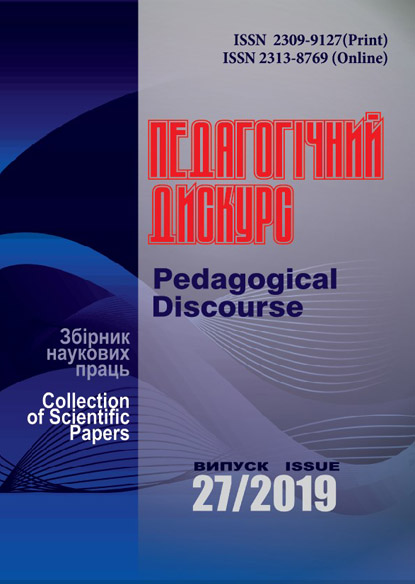Professional Training of Electronics Engineers in the USA: Organization and Network of Higher Education Institutions
Abstract
US higher engineering education is attracting more and more students these years. While the effectiveness of US higher engineering education is generally recognized, few studies have focused on the organization of higher education within a specific engineering specialism. In this article, the current situation of US higher engineering education is reviewed focusing especially on programs for electronics professionals. The article studies the organization of higher education institutions (HEI) in the USA and outlines the features of a network of HEIs that provide Bachelor’s and Master’s programs in electronics. This paper describes the approaches to classification of US HEIs, presents quantitative data on the number of students depending on the type of HEI, and identifies three most popular types of US HEIs that attract the highest number of students by offering degrees in electronics. Three most respected world ranking systems of HEIs were compared in order to determine quantitative and territorial characteristics of HEIs in the field of electrical and electronic engineering and identify the types of leading HEIs that provide training for potential professionals in the field of electronics. The findings reveal that structural characteristics of HEIs granting degrees in electronics appear to be heterogeneous. The results also showed that electronics education programs are mostly delivered by such institutions as colleges and schools, and the most common educational program covers the full regulatory period. It is found that among the surveyed US HEIs offering training for electronics professionals half of the institutions are state-owned, and the distinguishing feature of the vast majority of universities is their focus on high quality of research and development.
Downloads
References
About Academic Ranking of World Universities. (2019). Retrieved from http://www.shanghairanking.com/aboutarwu.html [in English].
Altbach, P. G. (2015, May). The McCormic Classification of American Higher Education: More-and Less-Than Meets the Eye. International Higher Education, 80, 21–23 https://doi.org/10.6017/ihe.2015.80.6153 [in English].
American Board of Engineering Technology. (2019). Accredited programs. Retrieved from https://amspub.abet.org/aps/name-search?searchType=program&keyword=electronics [in English].
Carnegie Classification of Academic Institutions. (2018). Bloomington: Center for Postsecondary Research Indiana University School of Education. Retrieved from https://carnegieclassifications.iu.edu/downloads/CCIHE2018-FactsFigures.pdf [in English].
Educational attainment. (2017). US Census Bureau. Retrieved from https://factfinder.census.gov/faces/tableservices/jsf/pages/productview.xhtml?src=CF [in English].
Higher Education Opportunity Act 1965. (2008). Retrieved from https://www.gpo.gov/fdsys/pkg/PLAW-110publ315/pdf/PLAW-110publ315.pdf [in English].
Integrated Postsecondary Education Data System 2011–12 Survey Materials. (2012). National Centre for Education Statistics. Retrieved from https://nces.ed.gov/pubs2012/2012293.pdf[in English].
Integrated Postsecondary Education Data System 2019–20 Survey Materials: Glossary. (2019). National Center for Education Statistics. Retrieved from https://surveys.nces.ed.gov/ipeds/Downloads/Forms/IPEDSGlossary.pdf [in English].
Ira A. Fulton Schools of Engineering. (2019). Retrieved from https://engineering.asu.edu/undergraduate-degree-programs/ [in English].
McCormic, A. C. (2006). The Carnegie Classification of Institutions of Higher Education. In A. C. McCormic OECD Workshop on Institutional Diversity. The Carnegie Foundation for the Advancement of teaching. Retrieved from http://www.oecd.org/education/imhe/37800086.pdf [in English].
Morse R., Vega-Rodriguez J. (2019). How U.S. News Calculated the Best Global Universities Rankings. U.S.News Education. Retrieved from https://www.usnews.com/education/best-global-universities/articles/methodology [in English].
QS World University Rankings Methodology. (2019). QS Top Universities. Retrieved from https://www.topuniversities.com/qs-world-university-rankings/methodology [in English].
Shanghai Ranking’s Global Ranking of Academic Subjects 2019: Electrical & Electronic Engineering. (2019). Academic Ranking of World Universities. Retrieved from http://www.shanghairanking.com/Shanghairanking-Subject-Rankings/electrical-electronic-engineering.html [in English].
Stanford: Facts. (2019). Retrieved from https://facts.stanford.edu/ [in English].
World University Rankings. (2019). THE World University Rankings 2020. Retrieved from https://www.timeshighereducation.com/world-university-rankings/2020/worldranking#!/page/0/length/25/subjects/3135/sort_by/rank/sort_order/asc/cols/stats [in English].
Yale School of Engineering & Applied Science. (2019). Retrieved from https://seas.yale.edu/departments/electrical-engineering/undergraduate-study/undergraduate-curriculum-information [in English].
Bratko, M. V. (2017). Systema osvity SShA: struktura, tradytsii upravlinnia, osoblyvosti vyshchoi osvity [The Educational System of the USA: Structure, Traditions of Management, Features of Higher Education]. Osvitolohichnyi dyskurs – Educological Discourse, 3–4, 252–268. Retrieved from http://nbuv.gov.ua/UJRN/osdys_2017_3-4_22 [in Ukrainian].
Grebnev, L., Popov, V. (2004). Ob organizacii vy’sshego texnicheskogo obrazovaniya v SShA [On Ogranisation of Higher Education in the USA]. Vysshee obrazovaniye v Rossii – Higher Education in Russia, 11, 150–165 [in Russian].
Derykhovska, V. I. (2016). Porivnialna kharakterystyka indykatyvnoho skladu otsinky VNZ u mizhnarodnykh reitynhakh [Comparative Characteristics of Higher Education Assessment Indicative Components in International Ratings]. Ekonomika. Finansy. Pravo (Ekonomika) – Economics. Finance. Law (Economics), 11, 26–30 [in Ukrainian].
Ihnatiuk, O. (2010). Teoretychni ta metodychni osnovy pidhotovky maibutnoho inzhenera do profesiinoho samovdoskonalennia v umovakh tekhnichnoho universytetu [Theoretical and Methodological Basis of Future Engineer Preparation for Professional Self-Improvement within the Context of Technical University] (Doctor’s thesis). Kharkiv [in Ukrainian].
Kozubovska, I. V., Stoika, O. Ya, & Sidun, L. Yu. (2015). Istoryko-pedahohichni aspekty rozvytku vyshchoi osvity v SShA (kinets KhKh – pochatok KhKhI stolittia) [Historical and Pedagogical Aspects of the Development of Higher Education in the USA] [Monograph]. Uzhhorod: Outdoor shark [in Ukrainian].
Pavlenko, O. V. (2018). Suchasnyi stan pidhotovky fakhivtsiv z elektroniky v zakladakh vyshchoi osvity SShA [Present Situation of Traning Electronics Specialists in US Higher Education Insitutions]. Molodyi Vchenyi – Young scientist, 12 (64), 111–114 [in Ukraininan].
Rifkin, B. (2009). O novy’x tendenciyax v vy’sshem obrazovanii SShA [On New Trends in Higher Education in the USA]. Vysshee obrazovaniye v Rossii – Higher Education in Russia, 5, 127–133 [in Russian].
Stoika, O. Ya. (2017). Vyshcha osvita SShA ta Ukrainy: spilni ta vidminni rysy [Higher Education in Ukraine and the USA: Common and Different Features]. Naulovyi visnyk Uzhhorodskoho Universytetu (Pedahohika. Sotsialna robota) – Scientific bulletin of Uzhhorod University (Pedagogy. Social work), 1 (40), 280–283 [in Ukrainian].
Forsait 2018: Analiz pidhotovky i perepidhotovky fakhivtsiv pryrodnychoho i tekhnichnoho spriamuvannia, vykhodiachy z tsilei staloho sotsialno-ekonomichnoho rozvytku Ukrainy do 2025 roku [Foresight 2018: Analysis of the Training and Retraining of Specialists in the Natural and Technical Direction, Based on the Goals of Sustainable Socioeconomic Development of Ukraine by 2025]. (2018). (pp. 14–19). Kyiv: Politechnika [in Ukrainian].
Tsarenko, I. O. (2014). Reitynhovi systemy ranzhuvannia vyshchykh navchalnykh zakladiv: ukrainski ta svitovi metodyky [Rating Systems for Ranging Higher Educational Instituions: Ukrainian and International Methodologies]. Naukovi pratsi Kirovohradskoho natsionalnoho tekhnichnoho universytetu (Ekonomichni nauky) – Collection of Scientific Works of Kirovohrad National Technical University (Economic Sciences), 26, 56–66 [in Ukrainian].
Copyright (c) 2019 Pedagogical Discourse

This work is licensed under a Creative Commons Attribution-NonCommercial-ShareAlike 4.0 International License.

















